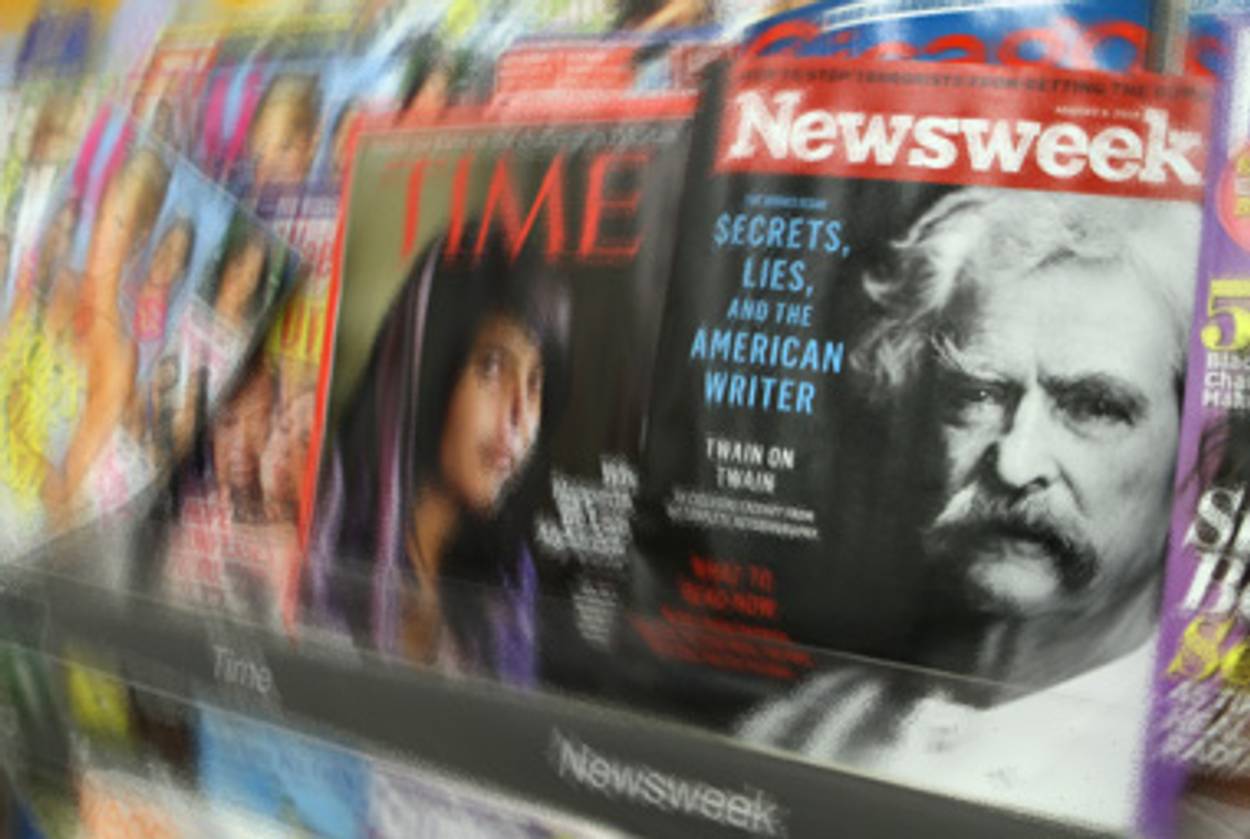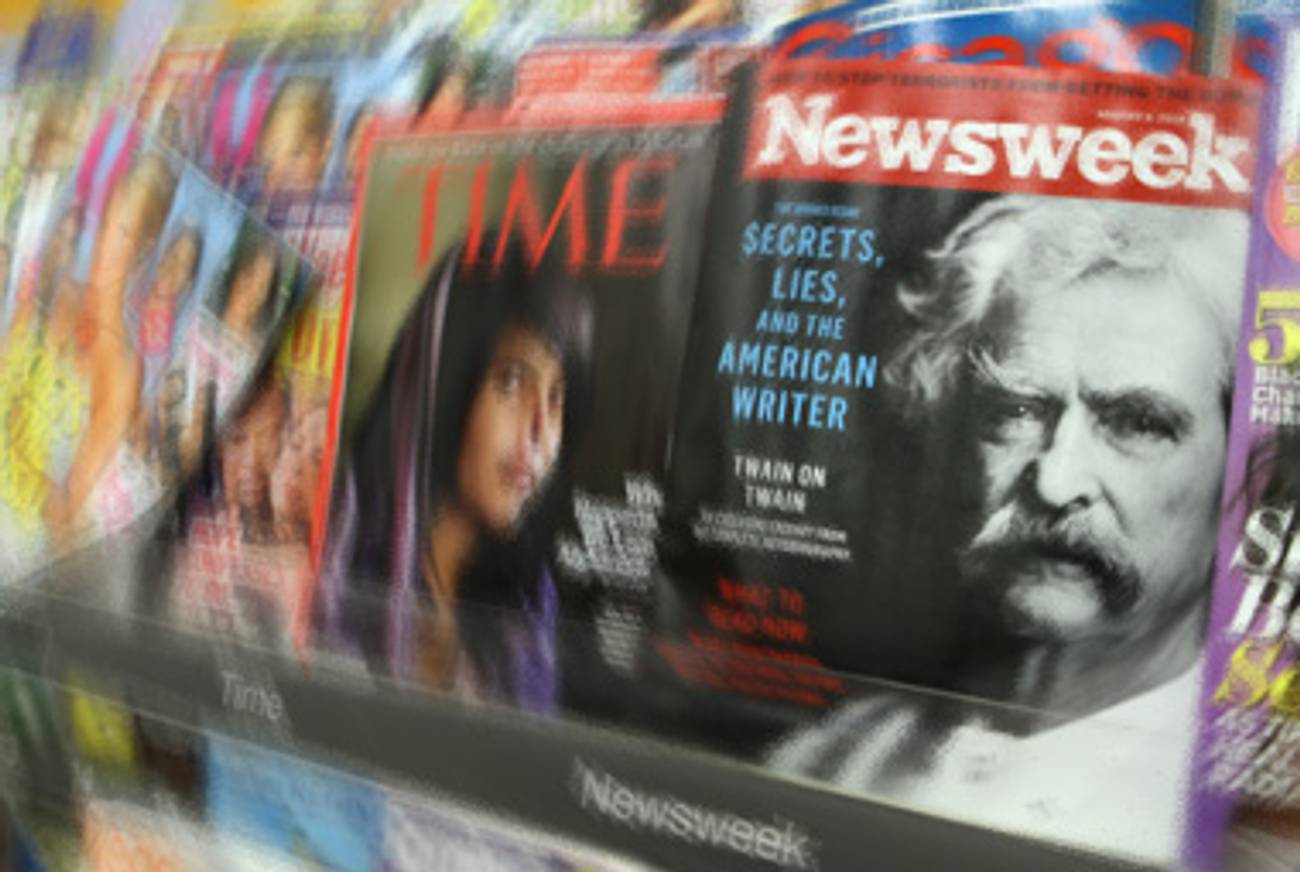Publish or Perish
Jews have always had a special connection to magazines, and it’s Jews—like Sidney Harman, new owner of Newsweek—who will reinvent them




Dear Sidney,
Although we’ve never met, I’d like to take this opportunity to congratulate you for your pending purchase of Newsweek magazine.
I’m not assuming you’re hearing much by way of congratulations these days. After all, everywhere you turn, you come across another report of the magazine industry’s nearing demise: Circulations are down, advertising is down, U.S. News & World Report has abandoned its print edition, 279 magazines folded in 2009 alone, and TV Guide—a magazine that once boasted the highest circulation in the country—was sold for $1, the same price you paid for Newsweek. And yet, you chose to enter the industry at this tough time, and I won’t be surprised if some in your circle tried to talk you out of the move.
As one who has devoted his life to writing for, editing, and publishing magazines—including 30 years as editor and then publisher of The Nation, and now as chairman of Columbia Journalism Review—let me try to put your mind at ease. Magazine journalism, Mr. Harman, isn’t busy dying, it’s struggling to be reborn. And now, as it was in the golden age of magazines, it would likely be us Jews who’ll revolutionize this essential industry.
Jews, after all, have always had a special place in their hearts for magazines. Even at this difficult moment, there is Nadine Epstein’s Moment (“the independent national Jewish magazine”), there is Commentary, there is Tikkun (the anti-Commentary), there is The Jewish Review of Books, there is Lilith (“the American-Jewish feminist magazine”), there is Jewish Frontier (for organized labor), and for young, Holocaust-mocking hipsters there is even Heeb, along with many, many others. If you’re reading this letter, you’re surely also aware of Tablet Magazine, which represents, along with jewcy.com and several other Web sites, innovative attempts to carry on the magazine tradition on a new technological platform.
As you walk into Newsweek’s offices, and as you wonder in which direction to lead a great American magazine, let me share with you a bit of good advice I once received from an unlikely source. Although I disagreed with the late Irving Kristol, the so-called godfather of neoconservatism, on many things, I think he was onto something almost existential when it comes to magazine publishing. “A lot of New York intellectuals”—which is to say, Jews—“have roots in Eastern Europe, where, unlike in England or France, there was no tradition of civility,” he told me once when I was interviewing him about intellectuals and magazines. “In England or France, you operate within a framework of existing institutions. In Eastern Europe, we wanted to change existing institutions, to improve them. The Cossack was the existing institution, so ideas were more important than institutions. That is why if you disagree with someone, you stop talking to him and start your own magazine.”
I would add that, whatever one thinks of the neoconservative movement, one must concede that, for better or worse, it would not have come into being had it not been for magazines like The Public Interest (co-edited by Kristol), which in effect launched it, and Norman Podhoretz’s Commentary (now edited by his son, John), which nourished it. Most likely, you have no designs to turn Newsweek into an ideological organ; but you would do well to heed Kristol’s advice, and perceive of your magazine not just as a source for news but also as an institution for the manufacturing and dissemination of ideas.
Having sat on the publisher’s chair for enough time myself, however, I can guarantee that if you go on talking about ideas, someone is going to try to tell you that magazines have no place in the Internet’s age of immediacy. Simply remind these gloomy folks that the year’s biggest political story—the fall of the general who wouldn’t shut up, Stanley McChrystal—was caused by a magazine, Rolling Stone, one of the few media organs that still permit reporters to hang out with sources for long periods of time, and that still allocate 7,500 words or more for a worthwhile story. I’d like to see a Web site, or even a newspaper, have this kind of patience.
I am tempted to end my letter by citing any number of examples from the past glories of American magazine journalism. I’m tempted to remind you of Ida Tarbell’s exposé of Standard Oil Co. in McClure’s at the turn of the last century, of John Hershey’s “Hiroshima,” Rachel Carson’s “Silent Spring,” and Hannah Arendt’s “Eichmann in Jerusalem” in The New Yorker. But instead, allow me to end with an anecdote that neatly captures what magazines, at their best, can do, and why we need them now more than ever.
Some years ago, when I was helping to put together a group of small shareholders to invest in The Nation, I was making a pitch before a group of well-wishers assembled by my friend Stanley Sheinbaum in his Brentwood, Calif., living room, when a middle-aged woman raised her hand and said, “Count me in. I can’t not invest.” When asked to say more, she told her story. Her father, she said, used to go to shul every Saturday with his father. And his father would sit there with a copy of The Nation on his lap, reading while the rabbi spoke. Why, her then-9-year-old father asked her grandfather, are you reading while the rabbi is talking? “Because,” said her grandfather, “what he is saying up there, I already know, but what this magazine is telling me down here, I don’t know.”
This, Mr. Harman, is our past. It is up to you to make it our future, as well.
Victor Navasky is the author of Kennedy Justice (1971), Naming Names (which won a National Book Award in 1982), and A Matter of Opinion (which won the George Polk Book Award in 2005), among other works. He worked as an editor at The New York Times Magazine, and he wrote a column, “In Cold Print” for The New York Times Book Review. Beginning in 1978, he was editor and then publisher of The Nation, America’s oldest weekly magazine, where he is now publisher emeritus. He is currently a professor at Columbia’s Graduate School of Journalism and the chairman of the Columbia Journalism Review.
Victor Navasky is the author of Kennedy Justice (1971), Naming Names (which won a National Book Award in 1982), and A Matter of Opinion (which won the George Polk Book Award in 2005), among other works. He worked as an editor at The New York Times Magazine, and he wrote a column, “In Cold Print” for The New York Times Book Review. Beginning in 1978, he was editor and then publisher of The Nation, America’s oldest weekly magazine, where he is now publisher emeritus. He is currently a professor at Columbia’s Graduate School of Journalism and the chairman of the Columbia Journalism Review.